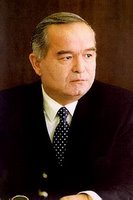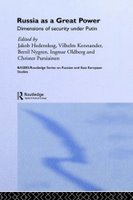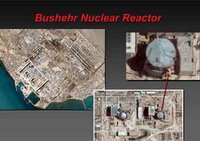 On 18 October 2005, one of the great architects of the Perestroika, Aleksandr Yakovlev, passed away. In commeration of Yakovlev, I here publish my account of his lecture from a visit in Stockholm, Sweden, in March 2003.Confronting the past
On 18 October 2005, one of the great architects of the Perestroika, Aleksandr Yakovlev, passed away. In commeration of Yakovlev, I here publish my account of his lecture from a visit in Stockholm, Sweden, in March 2003.Confronting the past
"Why delve into the past? Yes, why annoy people with what has been? What has been - has been." These questions were the starting-point of Aleksandr Yakovlev's Stockholm lecture. In analogy with L.N. Tolstoy, he pointed to the inability of himself and others to fathom the horrors of the past: "That will only happen when we admit that we are sick."
Over the past 15 years, Yakovlev has dedicated himself to the crimes of the soviet era; as chairman in the Commission for the Rehabilitation of Victims of Political Repression; and since 1993 through his own Yakovlev Foundation (
Mezhdunarodny Fond Demokratsii). By this work, some 4.5 million innocently convicted have been rehabilitated, among those Raoul Wallenberg. Still 400,000 cases remain to scrutinise. The work encompasses documented cases, which have undegone legal trial and often been convicted in accordance with § 58 of the soviet penal code. Of course, a lot more people were executed without trial. The lack of documentation, however, complicates rehabilitation in these cases. Still, it is in the area of documentation that an important part of the work has been made. The Yakovlev Foundation has until now published some 30 volumes of historical documents, of which 16 are available on the
Foundation website.
"Who is guilty?", Yakovlev asked. This recurrent question in Russia is often given a misdirected answer. When we point at Lenin, Stalin, and the Bolsheviks, we avoid to touch on our own guilt. We hide our heads in the sand, and pretend that it wasn't we that shot all those people; that it wasn't we that betrayed the neighbour to save ourselves. The truth is that the guilty are as much among us as they are in hell.
Although we succeeded in crushing Stalin's fascist totalitarianism, its heritage lives on. Then the book-fires burnt under supervision of Krupskaya. Then the churches were plundered. Then twelve-year-olds were sentenced to death.
The socialist construct - the great modernisation projects - rested on the shoulders of slave-labour. The camp system that arose from 1943, employed millions of people - from legislative system to camp prisoners.
An example of the continuity of the system was given at a visit in Magadan a few years back. Yakovlev, who was to inaugurate a monument to the victims of totalitarianism, got a cold reception. The explanation was that the liquidation of the Magadan camp system had led to massive unemployment. Of the 350,000 people in the camp system, 200,000 had been put into the street. "Why should they love you?" was the question confronting Yakovlev. In the same way, there is a "Magadan" inside us all.
It is not enough that our history is built on false documents. As we today are trying to get hold of the right documents, we are met by resistance from bureaucrats and passivity from the state. Many documents have also been burnt in individual attempts to cover ones own tracks. Other material was lost in 1941. Probably, we will not get access to all archives for a long time to come. This is not very strange. Just look how the US still hasn't opened up all the archives on the Kennedy assassination.
In the field
"History is made by coincidence." At Gorbachev's visit in Canada in 1983, it so happened that the host at a visit to a farm, was delayed. Yakovlev, then soviet ambassador to Canada, was given an opportunity to speak with Gorbachev between four eyes. The walk the two men made in the field, came to decide Yakovlev's role in the future reform process, which came to mean the end of the Soviet Union. While Gorbachev complained about the disintegration of the agricultural sector, Yakovlev got an opportunity to criticise soviet foreign policy. Three months later, Yakovlev was called back to Moscow to lead
IMEMO. [On IMEMO's role in the change of soviet foreign policy see: Checkel, J, 1997, "Ideas and International Political Change", Yale UP, New Haven]. The role of Yakovlev and IMEMO, initially, was to produce analyses and alternatives for Gorbachev's action, primarily within foreign policy.
The road to power
The day Chernenko died, 10 March 1985, Yakovlev got a visit by Primakov, who informed him that Gromyko's son wanted to speak with him. Without involving his father, the son wanted to explore the possibilities for cooperation between Gromyko and Gorbachev. In a following discussion, it turned out how fed up Gromyko was with foreign policy, and that he would like to reatreat to a post in the Supreme Soviet. He was, therefore, prepared to nominate Gorbachev for Secretary General. Yakovlev, who didn't want to play a fool in a political game, however, agreed to speak with Gorbachev. The message was received as much with caution as with interest. Gorbachev was prepared to work with Gromyko, but asked himself whether this feeler in reality was a provocation. Yakovlev, however, thought that Gromyko had no room for such games. In further talks between Yakovlev and Gromyko, the message was sent that conditions for Gromyko's nomination remained. At the Polit Bureau meeting on 11 March, Gromyko immediately nominated Gorbachev for Secretary General. The proposal was seconded by Grishin, who had been subject to speculations as potential successor to Chernenko. The decision to elect Gorbachev to Secretary General was thus unanimous [Soglasny - vse]. Lack of discussion and unanimity in decisions was a social heritage within the party since Lenin's days.
Reforms
The assumption that all proposals made, have been sanctioned from above, was eventually to become an important instrument for Yakovlev in the reform process. Ideology was, however, not the driving-force behind his reformatory role. Certainly, Yakovlev had been posted as ambassador in Ottawa because of his alleged liberalism. He was to be distanced from the ideological struggle. Yakovlev, all the same, doesn't characterise himself as an ideolgoue. He passed his exams in Marxism-Leninism, but that was all. Capitalism and socialism are words beyond his comprehension. Why put an ideological label on a country? Every country lives according to its own traditions. Instead, it was practice during Stalin that upset him.
Still, it was Yakovlev who introduced the concept of "Glasnost". He thought that the system would collapse, when people found out the truth about the crimes that had been committed. That was - as we all know - also what happened. How then, did we succeed in puttin down the soviet monster? A direct attack was unthinkable. One would be confronted by a "Magadan". If Yakovlev had been clear about his true intentions, he wouldn't have survived the day. Therefore, one had to deceive [obmanyvat] the nomenklatura. The party was convinced that reforms would renew and improve socialism; that the speed of development would increase. Only after a few years, they started to understand what was about to happen. The decision, on closed elections with several candidates, which was made at the January 1987 January plenary of the Central Committe, became an alarm-signal for the nomenklatura. The realisation that one was not about to be elected led to discussions on "Bolshevik principles". Of course, power was central.
What concerns the reforms, many mistakes were made. "We are masters at stepping on the rake." The fight against alcoholism is one example. Alcohol cannot be fought with slogans. The fight against corruption turned out to become an attack on old ladies selling carrots in the square. A system for quality control did not improve quality. Disappointment spread and the anecdotes also about this regime began to flourish.
One says that "time is a difficult companion." As soon as we are not in pace with time, misery overtakes us. The same thing happens as we are trying to catch up. The conclusion can only be that Russia is particularly difficult to reform.
The end
During 1991, the danger of a conspiracy became all the more apparent. As the August coup evolved, Yakovlev had already resigned. He warned Gorbachev four times - in writing - about what was to happen. Gorbachev, however, underestimated how enterprising and courageous his oppinents would be, and simply chose to go away on vacation. So the coup d'état and its failure came about.
It was obvious that the Soviet Union must be transformed into a confederation on a voluntary basis by agreement. The Belovezha summit was, still, illegitimate. Confronted by fait accompli, only the unavoidable decisions remained to be made. Gorbachev and Yeltsin met in the Kremling and Yakovlev was called there to assist. One hour before their meeting, Yakovlev was called for. He still doesn't know why. They sat another eight hours together. The nuclear portfolio and the top secret documents were turned over. It was generally a quiet and considerate discussion. Just think if they would have been able to cooperate like that all the time! Then, at least, the state divorce could have passed by in more civilised forms. The situation as it now was, mostly appeared peculiar. When everything had been finished, they all went for a meal. Gorbachev retired to rest a little. Yakovlev and Yeltsin sat on for a while, before Yakovlev joined Gorbachev. What struck Yakovlev was that the otherwise talkative Gorbachev, with tears in his eyes, only said "Vot tak, Sasha" [That's it, Alexander]. Thus, a great era had passed. To this day, Gorbachev's exploits are unrecognised in Russia. In due course, the young will though learn to understand and appreciate his role.
Power and future
During his time in the Polit Bureau (1987-1990), also Yakovlev experienced how it was when the people paraded by with his portrait. It was a feeling neither of joy or moral distancing. The human is weak and power transforms her. Subordinates are soon regarded as inferior. Therefore, it is better the more often people in power are exchanged. Regrettably, current developments are going in the opposite direction. The nomenklatura has learnt to win also democratic elections. The communists party has forgot its ideology in the strive for power. The important thing is to keep ones hold of the Duma. Accordingly, there are also discussions to allow the president to run for a third term. If one succeeds in that, there will soon be talk of a fourth term. It is all like a psychological disease, but Tolstoy also claimed that the state governs as one governs lunatics. Warning signs abound - from anthem to Dzerzhinsky statue - and tendencies are dangerous. Even if Yakovlev fears a re-totalitarianisaton, he holds it unlikely in today's information society. Steps towards a law-governed society have also been made, among which are that court decisions have become mandatory for arrests and that minors receive redcution of penalties. Thus, the future is as hopeful as it is worrying.
 It is safe to say that the blog scene reflecting "Eastern European" events is quite limited as compared to "hotter" regions such as the Middle East. True to its ambition of commenting and promoting quality blogs, Global voices makes efforts to introduce its readers to most aspects of the blogosphere and also to Eastern Europe, Russia, Caucasus & Central Asia. As for the many country-specific blogs on "Eastern Europe," there is, however, little information to be found. Therefore, I here try to account for Swedish blogs on the region.
It is safe to say that the blog scene reflecting "Eastern European" events is quite limited as compared to "hotter" regions such as the Middle East. True to its ambition of commenting and promoting quality blogs, Global voices makes efforts to introduce its readers to most aspects of the blogosphere and also to Eastern Europe, Russia, Caucasus & Central Asia. As for the many country-specific blogs on "Eastern Europe," there is, however, little information to be found. Therefore, I here try to account for Swedish blogs on the region. 












